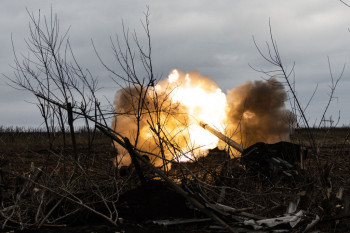President Volodymyr Zelensky on Jan. 17 talked to his German counterpart Frank-Walter Steinmeier via a video conference.
They discussed German military, humanitarian, and financial aid for Ukraine, as well as a peace plan to end Russia’s war.
Zelensky’s peace formula, presented in November at a G20 summit, envisages preventing ecocide in Ukraine, punishing those responsible for war crimes, withdrawing all Russian troops from the territory of Ukraine, restoration of Ukraine’s territorial integrity, and the release of all prisoners of war and deportees.
The proposals also call for ensuring energy security, food security, and nuclear safety.
The two leaders also discussed the situation on the front line in Ukraine, Zelensky wrote on Telegram.
“Thank you for Germany's comprehensive assistance to Ukrainians, which made our army stronger, and for the financial support. I would like to express particular gratitude to the citizens of Germany for sheltering Ukrainians in this difficult period,” he said.
Steinmeier, who was Germany's foreign minister in 2013-2017, had been a supporter of closer ties with Russia before the full-scale invasion of Ukraine began on Feb. 24, 2022.
Specifically, he was against expelling Russia from G8, supported economic integration between Russia and the EU and accused NATO of "warmongering" directed against Russia.
In April, Steinmeier admitted having made mistakes in his policy on Russia, saying the Nord Stream 2 gas pipeline project was among the biggest ones.
In October, Steinmeier paid a visit to Ukraine’s capital and announced new military aid, including two additional MARS II multiple launch rocket systems and four howitzers.
Zelensky's conversation with Steinmeier comes as Germany is expected to make a decision on whether to step up military aid for Ukraine.
Since the beginning of Russia's all-out invasion in February 2022, the German government has been criticized for delaying and blocking arms supplies to Ukraine. Amid pressure from the media, the public and NATO allies, Germany has increased its arms supplies to Ukraine but German Chancellor Olaf Scholz is still accused of being reluctant to antagonize Russian dictator Vladimir Putin.
Currently a lot depends on the position of Germany, since several countries are reportedly ready to supply German-made Leopard tanks to Ukraine. They need approval from the German government, which has not made a decision on the issue yet.
Scholz on Jan. 13 complained about alleged pressure to supply Leopard tanks to Ukraine and said that Germany would not rush to deliver weapons and would "weigh every step carefully," AP and Der Spiegel reported.
Bloomberg has reported, citing two unnamed officials familiar with the matter, that Germany would likely make a decision this week on whether to supply Leopard tanks to Ukraine.
The decision is expected to be made ahead of the Jan. 20 Ramstein defense summit, which will be devoted to coordinating military aid for Ukraine.










